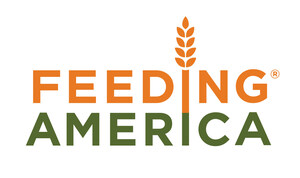8 Million Baby Boomers Are Facing Hunger In The U.S.
New Study by Feeding America Documents Struggles of Americans Age 50 to 64
CHICAGO, July 9, 2015 /PRNewswire-USNewswire/ -- More than eight million Baby Boomers age 50 to 64 are turning to charitable food assistance to make ends meet, according to a new report released today by Feeding America® made possible by a grant from AARP Foundation.
"Baby Boomers and Beyond: Facing Hunger After Fifty" documents lack of employment, housing instability, poor health and unpaid medical bills are among the top challenges facing this age group, most of whom are not age eligible for federal support programs like Social Security and Medicare.
"Our network serves 13 million older adults and we expect that number to rise," said Matt Knott, president of Feeding America. "Every day for the next 15 years, 10,000 people will turn 65. This is absolutely the right time to be taking a hard look at the data to determine the challenges our mature clients face."
The report was produced by Feeding America with help from an AARP Foundation grant. It is based on data collected for Feeding America's Hunger in America 2014 report, the largest study of charitable food assistance in the U.S. More than 60,000 clients confidentially answered questions about their personal and household circumstances for the study. Feeding America is a network of 200 food banks that provide food and groceries to 46 million Americans annually.
"Hunger is an invisible problem that millions of older Americans battle silently every day. We have found that the "youngest old" – people 50 to 59 – tend to suffer the most, often having to skimp on meals or skip them altogether because they can't afford them," said AARP Foundation President Lisa Marsh Ryerson. "Feeding America's boomer-focused research reinforces our earlier research on this hidden and very serious problem, and intensifies our commitment to address it."
The data provide comprehensive profiles of older adults and their households in three categories:
- All adults above the age of 50
- "Pre-seniors," age 50 to 64
- Seniors, age 65 to 74 and age 75 and above
Pre-seniors are particularly vulnerable to hardship and are more likely than their older peers to:
- Experience housing instability, such as having to move in with friends or family in the past year (18%) or facing foreclosure or eviction in the past five years (15%);
- Describe their own health as fair to poor (59%);
- Have unpaid medical or hospital bills (58%);
- Live in a household experiencing poverty (72%); and
- Live in a household that is food insecure – defined by the USDA as the state of being without reliable access to a sufficient quantity of affordable, nutritious food (86%).
Of further concern, pre-seniors are struggling to find and keep jobs in a slowly recovering job market and many of the pre-seniors who are working do not earn enough to get by. While it is expected that individuals exit the workforce as they age, nearly two-thirds of pre-seniors had not been employed in the past year, with most citing poor health or disability as the reason.
The report also examined multigenerational households, specifically households with at least one older adult and at least one grandchild. Among these households, 77 percent live at or below the federal poverty line.
Multigenerational households reported high rates of making "tradeoffs" in the past year to afford basic necessities, with households choosing between paying for food and:
- Utilities (76%);
- Transportation (75%);
- Medical care (74%); and
- Housing (61%).
They also report employing various coping strategies, including buying the cheapest food available, knowing it was not the healthiest option (82%).
The Feeding America network has devoted increased resources to programs designed to address the unique health, economic and nutritional needs of an aging population. The Feeding America Senior Grocery Program, strategic advocacy for critical government programs that benefit older Americans such as the Commodity Supplemental Food Program and Supplemental Nutrition Assistance Program, and awareness building engagement campaigns like #SolveSeniorHunger™ bring more food to older Americans in need and more attention to this intensifying issue.
The full report of Baby Boomers and Beyond: Facing Hunger After Fifty can be found at: FeedingAmerica.org/SolveSeniorHunger.
About Feeding America
Feeding America is the nationwide network of 200 food banks that leads the fight against hunger in the United States. Together, we provide food to more than 46 million people through 60,000 food pantries and meal programs in communities across America. Feeding America also supports programs that improve food security among the people we serve; educates the public about the problem of hunger; and advocates for legislation that protects people from going hungry. Individuals, charities, businesses and government all have a role in ending hunger. Donate. Volunteer. Advocate. Educate. Together we can solve hunger. Visit www.feedingamerica.org, find us on Facebook or follow us on Twitter.
About AARP Foundation
AARP Foundation is working to win back opportunity for struggling Americans 50+ by being a force for change on the most serious issues they face today: housing, hunger, income and isolation. By coordinating responses to these issues on all four fronts at once, and supporting them with vigorous legal advocacy, the Foundation serves the unique needs of those 50+ while working with local organizations nationwide to reach more people, strengthen communities, work more efficiently and make resources go further. AARP Foundation is AARP's affiliated charity. Learn more at www.aarpfoundation.org.
Contact:
Angela DePaul, Media Relations
Feeding America
35 E. Wacker Drive, Chicago
P: 312.641.5695
E: [email protected]
Charlotte Castillo, Media Relations
AARP
601 E St. NW
P: 202.434.2560
E: [email protected]
Logo - http://photos.prnewswire.com/prnh/20140711/126271
SOURCE Feeding America
Related Links
WANT YOUR COMPANY'S NEWS FEATURED ON PRNEWSWIRE.COM?
Newsrooms &
Influencers
Digital Media
Outlets
Journalists
Opted In





Share this article